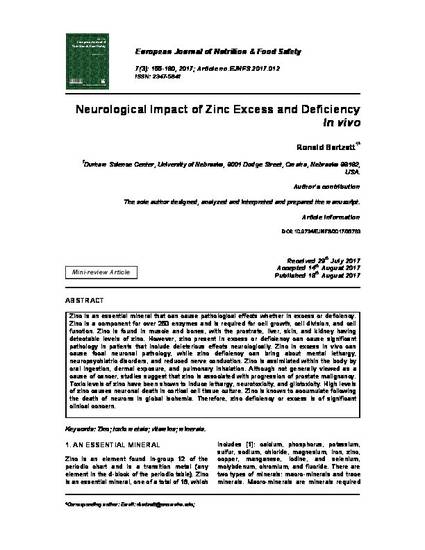
Zinc is an essential mineral that can cause pathological effects whether in excess or deficiency. Zinc is a component for over 250 enzymes and is required for cell growth, cell division, and cell function. Zinc is found in muscle and bones, with the prostrate, liver, skin, and kidney having detectable levels of zinc. However, zinc present in excess or deficiency can cause significant pathology in patients that include deleterious effects neurologically. Zinc in excess in vivo can cause focal neuronal pathology, while zinc deficiency can bring about mental lethargy, neuropsychiatric disorders, and reduced nerve conduction. Zinc is assimilated within the body by oral ingestion, dermal exposure, and pulmonary inhalation. Although not generally viewed as a cause of cancer, studies suggest that zinc is associated with progression of prostate malignancy. Toxic levels of zinc have been shown to induce lethargy, neurotoxicity, and gliotoxicity. High levels of zinc causes neuronal death in cortical cell tissue culture. Zinc is known to accumulate following the death of neurons in global ischemia. Therefore, zinc deficiency or excess is of significant clinical concern.
Available at: http://works.bepress.com/drronald-bartzatt/9/

© 2017 Bartzatt; This is an Open Access article distributed under the terms of the Creative Commons Attribution License (http://creativecommons.org/licenses/by/4.0), which permits unrestricted use, distribution, and reproduction in any medium, provided the original work is properly cited.
DOI: 10.9734/EJNFS/2017/35783